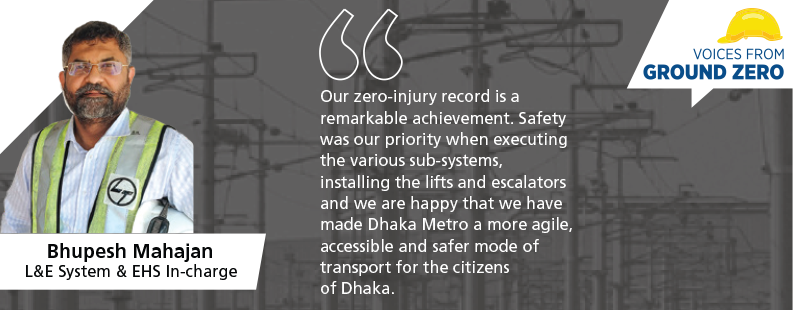DHAKA COMMUTES FASTER, EMITS LESS, THANKS TO L&T
Dhaka Metro CP 07
A visionary initiative, the Dhaka Metro CP07 Project, has transformed urban mobility in Dhaka, Bangladesh, combining cutting-edge technology and advanced engineering. Despite the complexities and challenges of executing a large-scale, urban infrastructure project in a foreign country, the Railway SBG team completed the two phases on time to deservedly win L&T Construction’s Timely Delivery Award. Phase 1 was completed under the leadership of Sunil Khattar, (then Project Manager and now heading the Metro BU, Railway SBG) followed by Phase 2, initially led by Ashish Gupta (now GM & Head – SCM) and thereafter under the young leadership of Project Manager, Debakash Banerjee.

Apart from easing traffic congestion and reducing travel time for daily commuters from approximately 4 hours to just 45 minutes, the reduced reliance on private vehicles is helping reduce carbon emissions by over 200,000 tons annually.
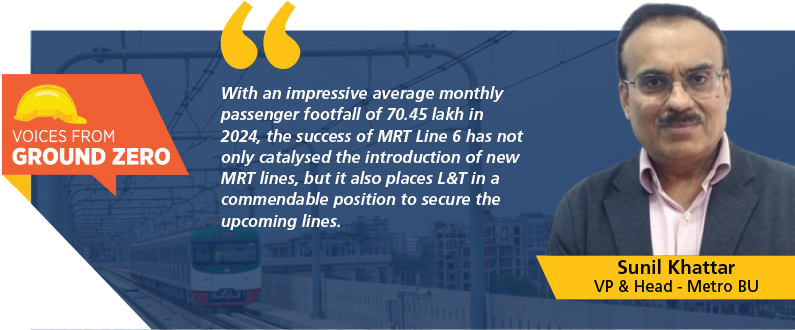
The impact of the project on the people of Dhaka is even more pronounced: Apart from easing traffic congestion and reducing travel time for daily commuters from approximately 4 hours to just 45 minutes, the reduced reliance on private vehicles is helping reduce carbon emissions by over 200,000 tons annually. Certainly, the city of Dhaka is breathing easier.
Marking L&T’s first ever fully integrated Electrical & Mechanical (E&M) systems venture in the metro domain, Phase 1 involved a 11.4 km stretch connecting Uttara North & Agargaon, inaugurated on December 28, 2022, by the then Hon’ble Prime Minister Sheikh Hasina, who thereafter also did the honours for Phase 2, another 9 km stretch from Agargaon to Motijheel, on November 4, 2023, completing the MRT Line 6.


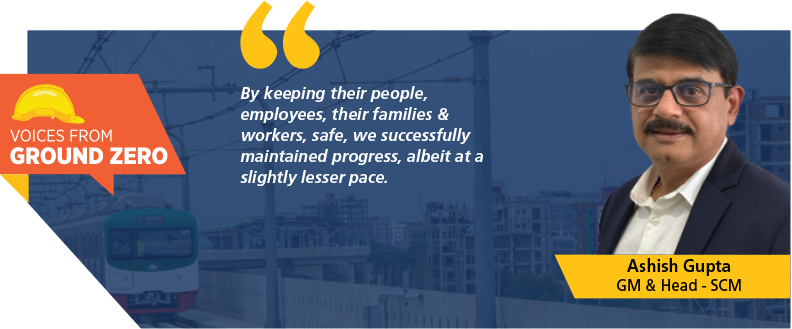
Maintaining a stiff asking rate
“Of course, we had our fair share of challenges,” Debakash smiles tightly, “that called for effective strategies, proactive problem-solving, and seamless coordination among all our stakeholders.”
Overcoming the impact of the pandemic: The team took the global disruptions in their collective stride, constantly coordinating with global suppliers to ensure timely manufacturing and shipping while the Bangladesh government chipped in by allowing e-filing of import permits. “By keeping their people, employees, their families & workers, safe, we successfully maintained progress, albeit at a slightly lesser pace,” says Ashish Gupta.
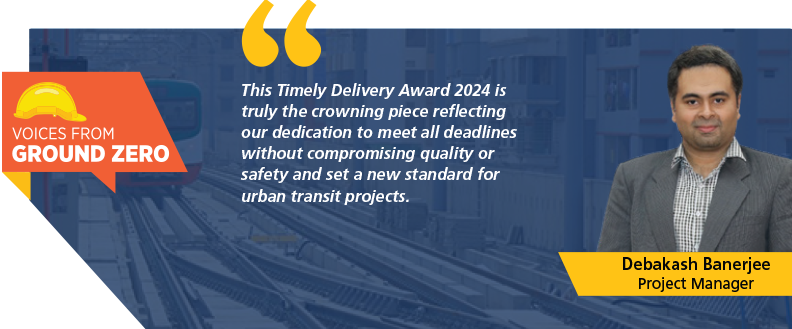
Managing the issues of working in an unknown geography: Navigating local regulations, understanding cultural nuances, and integrating the workforce were the team’s initial set of challenges. “It is only through extensive interface and collaboration with the local subcontractors that we were able to achieve efficiency and productivity,” shares Planning In-charge, Kollu Prasad. “In fact, the involvement of our front-line personnel in strategy development helped streamline operations.” To combat a slow bureaucratic process, the team regularly recalibrated their strategies, engaging with the local authorities to keep the project on track. “By resorting to a hybrid model of planning, which combined departmental, supply and measurement work, we succeeded to exceed our client’s expectations,” he says with a broad smile.
Ensuring the coexistence of old & new technologies: Introducing and integrating advanced technologies into a country with old infrastructure systems was challenging, especially in a region without an electrical railway system that relied on conventional signalling infrastructure. “Our E&M system that includes multiple specialized subsystems, required seamless integration of new systems with the existing traditional infrastructure,” points out Electrification In-charge, Shamim Ahmad Khan. “By adopting a proactive approach and assigning clear ownership for each segment, along with continuous training, effective communication, and strong problem-solving approaches, we successfully integrated and commissioned the new technology,” he grins with satisfaction.
Striking the right chord with the Employer: Although working with a new organization like the Dhaka Mass Transit Company Limited (DMTCL) had its own set of uncertainties, the team overcame them through seamless coordination with all parties involved and a collaborative approach, by winning the confidence of the Employer and the Engineer. “Our new organizational framework was leveraged to drive growth and development with a strong focus on training and knowledge transfer, ensuring that DMTCL’s team was equipped with the necessary skills and understanding to operate and maintain the system,” apprises Akshay Dhawan, Track Engineer, Interface & Quality In-charge. “Additionally, we provided dedicated maintenance support to ensure long-term system efficiency, reinforcing the collaborative approach and fostering sustainability for future operations.”
Solving regulatory issues: A particularly challenging issue was the stringent regulatory requirement imposed by the Bangladesh Investment Development Authority (BIDA), mandating a 1:5 ratio for foreign to local employees that required careful management of staffing and human resources by adhering to the local employment laws and yet maintaining the necessary expertise. “It is remarkable that we effectively balanced compliance with regulation and the need for specialized skills, to ensure that our workforce remained well-equipped to meet the demands of the project. This also contributed to in-country value through employment generation, skill upgradation as part of our ESG pursuits,” notes G Ashok Kumar, Finance, Accounts & Administration In-charge.

Safety & Quality at the forefront
For L&E System & EHS In-charge, Bhupesh Mahajan, a matter of great pride and delight was his project completing 10 million safe manhours without a single Loss Time Injury (LTI), adding to which were the several awards the project was honored with including the International Safety Award 2023 – Best in Country (Bangladesh), British Safety Council’s Sword of Honour and the ROSPA Gold Award 2023 for exemplary occupational health and safety practices. Additionally, the project was recognized with the Risk Award 2023, for their proactive risk management and mitigation strategies. “Our zero-injury record is a remarkable achievement,” gushes Bhupesh. “Safety was our priority when executing the various sub-systems, installing the lifts and escalators and we are happy that we have made Dhaka Metro a more agile, accessible and safer mode of transport for the citizens of Dhaka.”
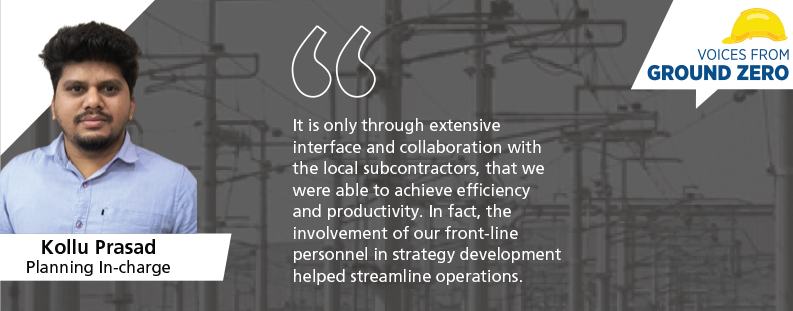
Winning the Quality Trophy in 2022 and 2020, alongside the Best Performing QMS Awards for 2020–2021 and 2022–2023 in RSBG demonstrated the team’s commitment to quality and operational excellence. “Our focus on workplace efficiency earned us the Best 5S Implementation Award for FY 2022– 2023,” smiles Debakash, “and this Timely Delivery Award 2024 is truly the crowning piece reflecting our dedication to meet all deadlines without compromising quality or safety and set a new standard for urban transit projects.”
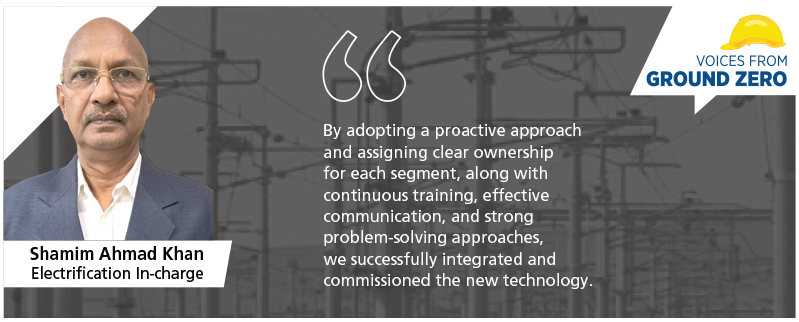
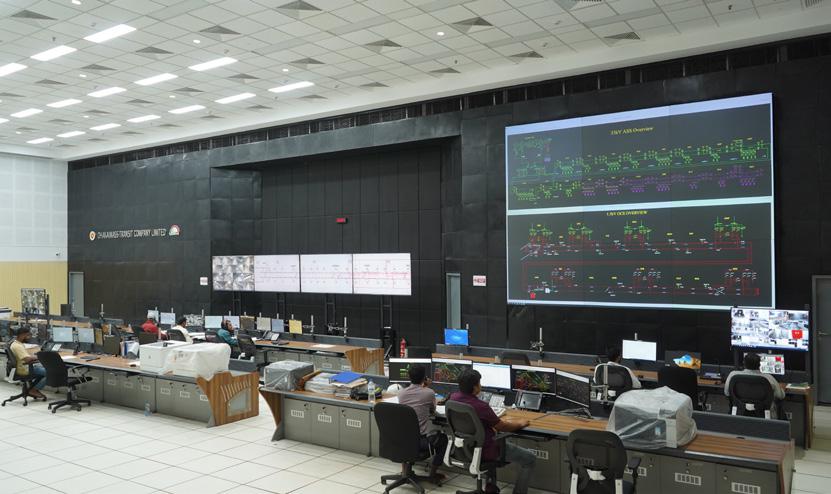
Future Opportunities
Following the successful completion of E&M works and the operationalization of the MRT Line 6, the metro system has been extended by 1.12 km to include the Kamlapur section. “With an impressive average monthly passenger footfall of 70.45 lakh in 2024, the success of MRT Line 6 has not only catalysed the introduction of new MRT lines such as MRT Line 1, Line 5-Northern Route, Line 5-Southern Route, Line 2 & Line 4, but also places L&T in a commendable position to secure the upcoming lines,” says Sunil Khattar, VP and Head – Metros BU.
